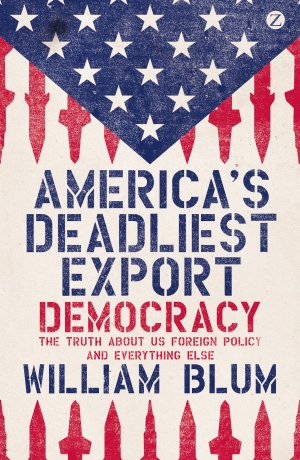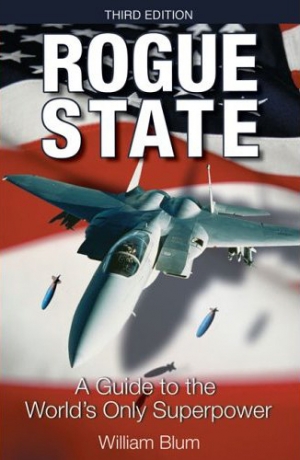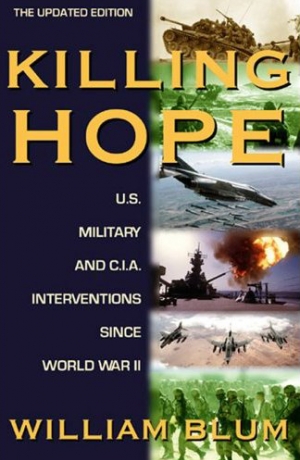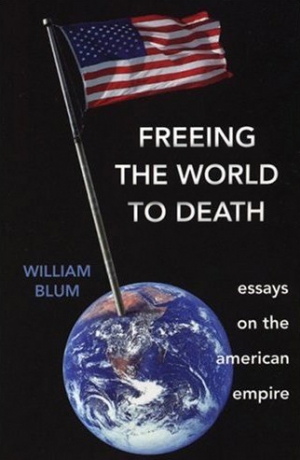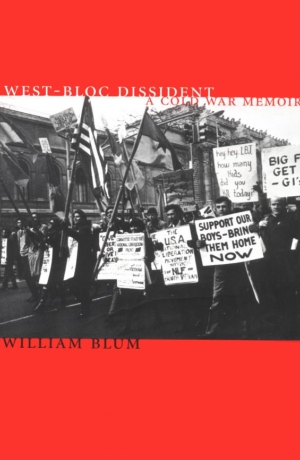The Anti-Empire Report #90
By William Blum – Published February 3rd, 2011
A cautionary tale
In July of 1975 I went to Portugal because in April of the previous year a bloodless military coup had brought down the US-supported 48-year fascist regime of Portugal, the world’s only remaining colonial power. This was followed by a program centered on nationalization of major industries, workers control, a minimum wage, land reform, and other progressive measures. Military officers in a Western nation who spoke like socialists was science fiction to my American mind, but it had become a reality in Portugal. The center of Lisbon was crowded from morning till evening with people discussing the changes and putting up flyers on bulletin boards. The visual symbol of the Portuguese “revolution” had become the picture of a child sticking a rose into the muzzle of a rifle held by a friendly soldier, and I got caught up in demonstrations and parades featuring people, including myself, standing on tanks and throwing roses, with the crowds cheering the soldiers. It was pretty heady stuff, and I dearly wanted to believe, but I and most people I spoke to there had little doubt that the United States could not let such a breath of fresh air last very long. The overthrow of the Chilean government less than two years earlier had raised the world’s collective political consciousness, as well as the level of skepticism and paranoia on the left.
Washington and multinational corporate officials who were on the board of directors of the planet were indeed concerned. Besides anything else, Portugal was a member of NATO. Destabilization became the order of the day: covert actions; attacks in the US press; subverting trade unions; subsidizing opposition media; economic sabotage through international credit and commerce; heavy financing of selected candidates in elections; a US cut-off of Portugal from certain military and nuclear information commonly available to NATO members; NATO naval and air exercises off the Portuguese coast, with 19 NATO warships moored in Lisbon’s harbor, regarded by most Portuguese as an attempt to intimidate the provisional government. In 1976 the “Socialist” Party (scarcely further left and no less anti-communist than the US Democratic Party) came to power, heavily financed by the CIA, the Agency also arranging for Western European social-democratic parties to help foot the bill. The Portuguese revolution was dead, stillborn. 1
The events in Egypt cannot help but remind me of Portugal. Here, there, and everywhere, now and before, the United States of America, as always, is petrified of anything genuinely progressive or socialist, or even too democratic, for that carries the danger of allowing god-knows what kind of non-America-believer taking office. Honduras 2009, Haiti 2004, Venezuela 2002, Ecuador 2000, Bulgaria 1990, Nicaragua 1990 … dozens more … anything, anyone, if there’s a choice, even a dictator, a torturer, is better.
We are so good even our enemies believe our lies
I’ve devoted a lot of time and effort to the question of how to reach the American mind concerning US foreign policy. To a large extent what this comes down to is trying to counterbalance the lifetime of indoctrination someone raised in the United States receives. It comes in news stories every day.
On January 27, the Washington Post ran a story about the State Department personnel who were held hostage at the American embassy in Tehran, Iran for some 14 months, 1979-81. The former hostages were preparing to hold a 30th anniversary remembrance the next day.
“It was wrong on every conceivable count,” said L. Bruce Laingen, who was the charge d’affaires. “It was absolutely wrong. … That is my most vivid memory today.” Former political officer John W. Limbert agrees, saying that he “would take any opportunity” to tell his captors “what a terrible thing they had done by their own criteria.”
What criteria, I wonder, did the man think his Iranian captors were guided by? In 1953, the United States had overthrown the democratically elected government of Mohammad Mossadegh, resulting, as planned, in the return to power from exile of the Shah. This led to 26 years of rule by oppression including routine torture as the Shah was safeguarded continuously by US military support. Is this not reason enough for Iranians to be bitterly angry at the United States? What was Mr. Limbert thinking? What do Americans who read or hear such comments think? They read or hear distorted news reports pertaining to America’s present or historical role in the world every day, and like in the Washington Post article cited here — there’s no correction by the reporter, no questions asked, no challenge put forth to the idea of America the Noble, America the perpetual victim of the Bad Guys.
Atheist: “Blasphemy is a victimless crime.”
Salman Taseer was murdered in Pakistan a few weeks ago. He was the governor of Punjab province and a member of the secular Pakistan People’s Party. The man who killed him, Mumtaz Qadri, was lauded by some as a hero, showering rose petals on him. Photos taken at the scene show him smiling.
Taseer had dared to speak out against Pakistan’s stringent anti-blasphemy law, calling for leniency for a Christian mother sentenced to death under the blasphemy ban. A national group of 500 religious scholars praised the assassin and issued a warning to those who mourned Taseer. “One who supports a blasphemer is also a blasphemer,” the group said in a statement, which warned journalists, politicians and intellectuals to “learn” from the killing. “What Qadri did has made every Muslim proud.” 2
Nice, really nice, very civilized. It’s no wonder that decent, god-fearing Americans believe that this kind of thinking and behavior justify Washington’s multiple wars; that this is what the United States is fighting against — Islamic fanatics, homicidal maniacs, who kill their own countrymen over some esoteric piece of religious dogma, who want to kill Americans over some other imagined holy sin, because we’re “infidels” or “blasphemers”. How can we reason with such people? Where is the common humanity the naive pacifists and anti-war activists would like us to honor?
But war can be seen as America’s religion — most recently Pakistan, Iraq, Afghanistan, Somalia, Yemen, and many more in the past — all non-believers in Washington’s Church of Our Lady of Eternal Invasion, Sacred Bombing, and Immaculate Torture, all condemned to death for blasphemy, as each day the United States unleashes blessed robotic death machines called Predators flying over their lands to send “Hellfire” (sic) missiles screaming into wedding parties, funerals, homes, not knowing who the victims are, not caring who the victims are, thousands of them by now, as long as Washington can claim each time –- whether correctly or not — that amongst their number was a prominent blasphemer, call him Taliban, or al Qaeda, or insurgent, or militant. How can we reason with such people, the ones in the CIA who operate these drone bombers? What is the difference between them and Mumtaz Qadri? Qadri was smiling in satisfaction after carrying out his holy mission. The CIA man sits comfortably in a room in Nevada and plays his holy video game, then goes out to a satisfying dinner while his victims lay dying. Mumtaz Qadri believes passionately in something called Paradise. The CIA man believes passionately in something called American Exceptionalism.
As do the great majority of Americans. Our drone operator is not necessarily an “extremist”. Sam Smith, the publisher of the marvelously readable newsletter, the Progressive Review, recently wrote: “One of the greatest myths draped over this land is that the so-called wing nuts mainly come from the far right and left. And that there is, however, a wise and moderate establishment that will save us from their madness. In fact, the real wing nuts are to be found in the middle. … having captured both public office and major media, [they] spread disaster, death and decay with impunity. Take, for example, the 60,000 some American troops killed in pointless wars beginning with Vietnam. Now count the number of political assassinations, hate murders, terrorist acts and so forth. There is simply no comparison. Yet every war that we have fought in modern times has been the direct choice of the American establishment, those who pompously describe themselves as moderates, centrists, or bipartisan.” 3
Extending the comparison: In 2008 a young American named Sharif Mobley moved to Yemen to study Arabic and religion. American officials maintain that his purpose was actually to join a terror group. They “see Mobley as one of a growing cadre of native-born Americans who are drawn to violent jihad.” 4 Can one not say as well that the many young native-born Americans who voluntarily join the military to fight in one of America’s many foreign wars “are drawn to violent jihad”?
Items of interest from a journal I’ve kept for 40 years
(Some written by me, most by others; for those lacking a source you can send me an email.)
“The biggest crimes of our generation — torture, warrantless wiretapping, and extraordinary rendition — would not have come to light but for the unauthorized disclosure of classified information. For the hand-wringing “but we can’t willy-nilly reveal classified information” crowd, do you think Abu Ghraib wasn’t classified?” – Jesselyn Radack
“The principal beneficiary of America’s foreign assistance programs has always been the United States.” – US Agency for International Development, “Direct Economic Benefits of U.S. Assistance Programs” (1999); i.e., most of the money is paid directly to US corporations.
In 1963, the Kennedy administration was faced with a steadily disintegrating situation in Vietnam. At a turbulent cabinet meeting, Attorney General Robert Kennedy asked: If the situation is so dire, why not withdraw? Historian Arthur Schlesinger, present at the meeting, noted how “the question hovered for a moment, then died away.” It was “a hopelessly alien thought in a field of unexplored assumptions and entrenched convictions.”
I watched 21 Marines in full dress uniform with rifles, fire a 21-gun salute to the President. It was then that I realized how far America’s military had deteriorated. Every one of them missed the bastard.
Soviet expansion was self-defense, not imperialism like with the United States. The Soviets, in World War I and II, lost about 40 million people because the West had used Eastern Europe as a highway to invade Russia. It should not be surprising that after WW2 the Russians were determined to close down that highway.
In March 2010 Secretary of “Defense” Robert Gates complained that “the general [European] public and the political class” are so opposed to war they are an “impediment” to peace.
The major problem in establishing both the United States and Israel as nations was what to do with the indigenous people. Same solution. Kill ‘em. Without legality. Without mercy.
From the film “The Battle of Algiers”:
Journalist: M. Ben M’Hidi, don’t you think it’s a bit cowardly to use women’s baskets and handbags to carry explosive devices that kill so many innocent people?
Ben M’Hidi: And doesn’t it seem to you even more cowardly to drop napalm bombs on defenseless villages, so that there are a thousand times more innocent victims? Of course, if we had your airplanes it would be a lot easier for us. Give us your bombers, and you can have our baskets.
… the seamless transition from the Cold War to a perpetual Global War on Terrorism
One of the reasons some countries allow US bases is because the leaders are worried about being overthrown in a coup and they think that the presence of the US military might discourage such action, or that if a coup breaks out the US can help to put it down. There’s also the large payments made to the government by the US and the prestige factor. Small countries can have inferiority complexes and, as absurd as it may seem to the likes of you and I, having an American base in the country can seem to be a feather in their cap; one of the same reasons they join NATO. Another reason for a base: the US can have intelligence information embarrassing to the country’s leader. This is known as blackmail.
George Washington referred to the new American republic as the “infant empire”
Foreign aid might be defined as a transfer of money from poor people in rich countries to rich people in poor countries.
“He [Obama] is trying to say: ‘Do not hate us … but we will continue to kill you’.” – Ayman al-Zawahri, Al Qaeda’s second-in-command
“Since both the US and France lost in Vietnam, then the ‘fight for our freedom’ must have been unsuccessful, and we must be under the occupation of the North Vietnamese Army. Next time you’re out on the street and you see a passing NVA patrol, please wave and tell them Tim says hello.” – Tim Moriarty
The American Museum of History, on the Mall in Washington, DC: One of the popular exhibitions in recent years was “The Price of Freedom: Americans at War”. This included a tribute to the “exceptional Americans [who] saved a million lives” in Vietnam, where they were “determined to stop communist expansion”. In Iraq, other true hearts “employed air strikes of unprecedented precision”.
“The United States became the target of terrorists on 9/11 not because of the country’s freedom and democracy, but because U.S. Middle East policy has had nothing to do with freedom and democracy.” – Stephen Zunes
The Wikileaks documents raise issues of national embarrassment, not national security.
Orange, Rose and Green Revolutions in other countries require coordinated US government intervention aimed at creating what has been called “genetically modified” grassroots movements.
Mikhail Gorbachev: “I feel betrayed by the West. The opportunity we seized on behalf of peace has been lost. The whole idea of a new world order has been completely abandoned.” (Interview in 2000.)
George Bernard Shaw used three concepts to describe the positions of individuals in Nazi Germany: intelligence, decency, and Naziism. He argued that if a person was intelligent, and a Nazi, he was not decent. If he was decent and a Nazi, he was not intelligent. And if he was decent and intelligent, he was not a Nazi. — (I suggest that the reader make any substitution for the word “Nazi” s/he deems appropriate.)
“The whole art of Conservative politics in the 20th century is being deployed to enable wealth to persuade poverty to use its political freedom to keep wealth in power.” – Aneurin Bevan, Labour Party (UK) minister, 1897-1960
“Which adversary has a navy justifying our expenditure of $90 billion for 30 Virginia-class submarines, and which enemy air force justifies our plans for about 340 F-22 fighter planes at a cost of $63 billion? This is pork and waste writ large, making the ‘Bridge to Nowhere’ look like child’s play.” – Letter in the Washington Post, 2009
So many foreign leaders keep silent in the face of US crimes, even when they’re the victim, that we’ve gotten used to that. So Hugo Chávez’s outbursts can seem weird and dangerous.
A talk by William Blum
Saturday, April 2, 7:00pm
University of Pittsburgh at Titusville, PA
504 East Main Street
Broadhurst Auditorium
Titusville is about 2 hours by car from Pittsburgh and 2 1/2 hours from Cleveland. For further information: 888-878-0462, or email Mary Ann Caton at caton [at] pitt.edu.
Notes
- William Blum, “Rogue State: A Guide to the World’s Only Superpower”, pages 187, 228 for sources
- Washington Post, January 5, 2011
- Progressive Review, January 27, 2011
Any part of this report may be disseminated without permission, provided attribution to William Blum as author and a link to williamblum.org is provided.
